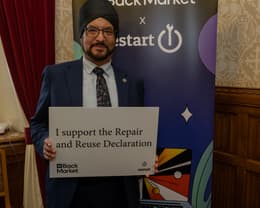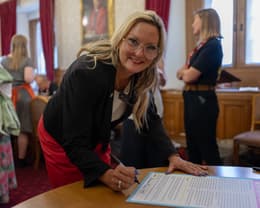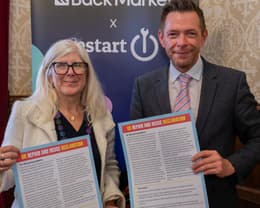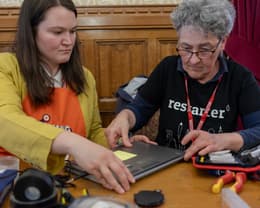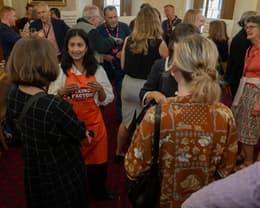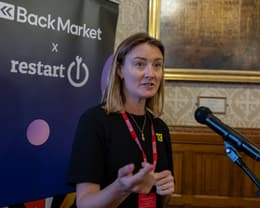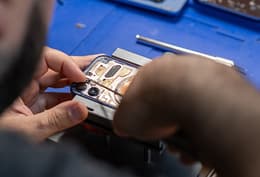
The Parliamentary Repair Café, hosted by Baroness Parminter, spotlights Back Market and The Restart Project’s joint mission to push the Right to Repair policy agenda in the UK.
On a balmy Wednesday in Downing Street, MPs mingled with tech experts and local leaders from community-led repair cafes, underneath the watchful gaze of an oil portrait of (former prime minister) Clement Attlee.
It was, perhaps, the first time the rendition of Atlee had looked down over an assortment of drills, electronics, and other repair tools — all buzzing in action.
NGO Green Alliance, Suez Recycling and Recovery UK and the Community Repair Network all gathered for a Repair Café, where speakers like veteran BBC radio and TV presenter Jeremy Vine snuck his way through the crowd to announce “I’m here, I’m here!” prior to his speech — and Mary Creagh, MP CBE the Minister for Nature, who attended the keynote speech, testified to the growing importance of creating a circular economy in the UK. The high turnout reflected how the Right to Repair movement is growing, as more MPs and political figures are ready to lend their voices to the movement (and maybe get their phones fixed, too).
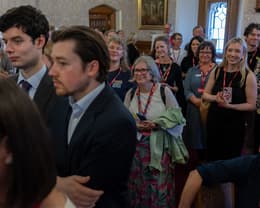
Why we’re here
Sponsored by social enterprise The Restart Project and Back Market – who have partnered to drive Right to Repair policy across the UK – and hosted by Baroness Parminter – a LibDem peer passionate about environmental action the event was held at The House of Lords to bolster political support for the Right to Repair declaration, as well as the Circular Economy Strategy in the UK.
Electronics and their repair are a newly included pillar in the Circular Economy Strategy, thanks in part to the policy momentum started by Back Market and Restart Project and carried on by the community that runs repair cafés across the country.
Katy Medlock, Back Market UK’s general manager, encouraged MPs in attendance to actively lend their support by signing the Right to Repair Declaration on the spot, which many did. The packed room, with attendees tucking themselves away into corners to discuss the Right to Repair, shows the increased appetite for electronic consumer rights, repair-friendly design, and reduced e-waste — phrases that 10 years ago would have never graced the halls of Parliament.
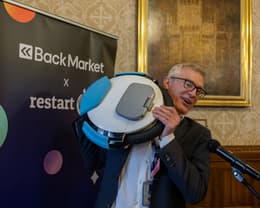
Jeremy Vine
From the podium
Fiona Dear, climate activist and co-director of the Restart Project, kicked off the presentation, highlighting the increased attendance and demand by MPs as well as community repair groups, of which there are 700 in the UK. Just 20 different groups were represented at the event. “I only wish we could have squeezed more into the room,” she said, since there had been more interest than square footage available.
Medlock reminded everyone of the major reason for the Circular Economy Strategy — the UK is the 2nd biggest contributor to e-waste per capita on a global scale. “These statistics,” she said, “can and should shock you. But this event is a tipping point for us.”
Jeremy Vine was next to speak. “Does anyone know what this is?” he asked the crowd, holding a Segway aloft like a trophy. “Broken!” echoed back someone in the crowd to laughter. They were correct. Vine detailed his 7-month-long plus journey to get Segway to repair his device, and how it led him to become an advocate for the Right to Repair movement. “I asked them [Segway] about repairing it,” he said, “And I think I just got laughter back.”
Behind the scenes
While last year’s (inaugural) Repair Café saw over 25 MPs in the room, this year saw at least 36 MPs represented, and 8 additional signatures on the spot to the Right to Repair declaration.
Given that the Chancellor of the Exchequer had delivered her Spending Review the same afternoon, this marked a significant achievement. The real heroes of the day, however, were the community members of Repair Cafés all across the UK. They pulled out all the stops to hustle their MPs into the room, knocked on every door, made every call, and thanks to their consistent pressure and belief in the movement, their MPs showed up.
Repair Cafés are free community spaces where neighbours learn to repair things, together. They share skills, create bonds, and educate members on their right to fix their own stuff. The bonds these Repair Cafés create became evident as members from across the country greeted each other by name and compared notes on which electronics manufacturers were the most difficult to work with.
Why this matters
While fixing tech is what brought folks together, the real aim is to fix the system. With devices like single-use vapes banned in the UK thanks to Circular Economy Minister Mary Creagh MP, it’s clear the shift towards a truly circular economy in Britain has the political headwinds it needs to make change.
As Back Market fights against fast tech — a system dominated by the overproduction and overconsumption of devices — collaborative work with organisations like Restart Project and working with community groups like Repair Cafés is key to creating a longer-lived tech ecosystem. “The circular economy is not an option, it’s an imperative for us,” said Creagh, “There’s no such thing as ‘away’.”


